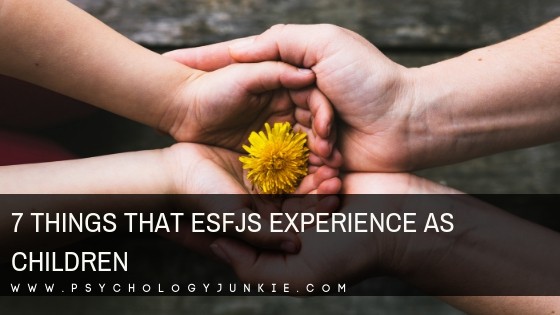The ESFJ Personality Type
If the world were a chaotic, crumbling mess (and unfortunately, it often is), ESFJs would be the ones running around making sure everyone had a snack, a pep talk, and a solid plan to get things back on track. They are the human embodiment of a warm casserole and a reassuring “You’ve got this!” text. Man…I think I need more ESFJs in my life.
Fueled by Extraverted Feeling (Fe), ESFJs have a powerful ability to read the emotional room and adjust accordingly—whether that means hyping people up, diffusing tension, or just making sure nobody feels left out. They see you standing over there in the corner trying to avoid awkward small talk, and they’re coming for you to make sure the small talk engages you rather than bores you.

For ESFJs, Introverted Sensing (Si) kicks in with a steel-trap memory for details, traditions, and the little things that make people feel valued. Did you casually mention your favorite childhood candy in passing? An ESFJ probably has it waiting for you the next time you’re feeling down.
They’re the ones organizing family reunions, throwing surprise birthday parties (with everyone’s actual favorite cake flavor, not just some generic vanilla nonsense), and making sure the group project doesn’t end in a fiery wreck of procrastination. Think of them as social glue—keeping people connected, smoothing over rough edges, and making sure everything runs smoothly, preferably with a color-coded spreadsheet.
Some famous ESFJs include Pope Francis, Andrew Carnegie, Sam Walton, and Anne Hathaway—people who, in their own ways, built things, led people, and made a lasting impact. Because if there’s one thing an ESFJ can’t do, it’s sit back and let things fall apart.
What Does ESFJ Stand For?
E = Extrovert. ESFJs gain energy from the people and things around them. They look to the outer world before looking inward to reflections and subjective ideas.
S = Sensation. ESFJs focus more on the concrete or existing reality than they focus on theories or conceptual ideas.
F = Feeling. ESFJs apply personal values and empathize in order to make a decision. They want what is best for the group or humanity as a whole.
J = Judging. ESFJs like having things settled, decided and structured. They are typically work-before-play people.
ESFJ Motivations and Weaknesses:
Stressors: Too much time alone, lack of meaningful relationships, conflict or criticism, a disorganized environment, procrastination.
Driving Force: To understand and connect with people in meaningful ways. To unify people towards ethical goals.
Backup Strength: Strong attention to detail and awareness of lessons learned from past experience.
Weakness: Can get so wrapped up in the feelings and needs of other people that they lose sight of the most logical approach to a situation. May have little patience for theories or ideas that detract from what they know.
ESFJ Personality Traits:
While people vary based on their background and their Enneagram type, average to healthy ESFJs often have the following characteristics:
- They like to discuss their emotions out loud and get feedback from others to help sort things out
- They enjoy friendly connections with a wide variety of people
- They prefer an organized, structured lifestyle
- They dislike not knowing what to expect
- They are usually good at reading people and knowing what they need
- You strive to achieve harmony in all their relationships
- They are usually tactful and considerate
ESFJ Careers:
ESFJs crave a job that will allow them to make a real difference in the lives of people and communities. A friendly atmosphere, clear expectations, and a sense of structure help them to feel comfortable and at home. ESFJs are able to do their best work when they know that they’re providing a practical service to people and improving their quality of life. They also feel at their best when they know specifically what’s expected of them, they’re given regular feedback, and they have opportunities to interact with co-workers in an authentic, friendly manner.
Career Suggestions: Teacher, Health care administrator, Athletic coach, Volunteer coordinator, Religious educator, Wilderness adventure leader, Veterinarian, Credit counselor, Travel consultant, Chef.
Famous ESFJs:
Pope Francis, Harry S. Truman, Colin Powell, Andrew Carnegie, Sam Walton, Regis Philbin, Barbara Walters, Anne Hathaway, Penelope Cruz, Jennifer Garner, Jessica Chastain, Mariah Carey, Celine Dion, Shania Twain, Hugh Jackman, Elton John, Ed Sheeran, Alicia Keys, Selena Gomez, Ariana Grande, Jessica Alba, Gal Gadot, Idris Elba
Dominant Function: Extraverted Feeling (Fe) – The Harmony Maestro
If ESFJs had a superpower, it would be emotional Wi-Fi. Their Fe (Extraverted Feeling) is constantly scanning the room, picking up on shifts in mood and tension like a psychic who doesn’t need a crystal ball. They intuitively understand the unspoken dynamics in a group—who’s feeling left out, who’s secretly beefing, and who just needs a plate of cookies and a hug.
This isn’t some conscious effort; it’s as natural as breathing. Fe at its best is all about harmony, collaboration, and making sure everyone feels valued. ESFJs don’t just want things to look good on the outside—they genuinely feel better when the people around them are happy. If you’ve ever wondered why an ESFJ will bend over backward to smooth over conflicts (even the ones they aren’t involved in), it’s because their emotional balance is tied to the well-being of the people they care about.
Their Fe also means they focus on shared experiences. ESFJs are the ones planning game nights, family traditions, and surprise birthday parties just because. They know the power of little gestures—writing a thoughtful thank-you note, bringing someone’s favorite coffee, remembering that weirdly specific thing you said you liked three months ago.
On the flip side, at its worst, Fe can be so focused on interpersonal dynamics that it plays them to its own advantage. Some unhealthy Fe-users become so focused on the harmony of their own in-group that they ostracize out-groups and gossip, spread rumors, or use negative social interplay to build their own cohesive friend group.
Auxiliary Function: Introverted Sensing (Si) – The Keeper of Traditions
Where Fe focuses on harmony, Si (Introverted Sensing) focuses on stability. ESFJs have a memory bank of past experiences, details, and patterns that help them get through life with a sense of grounded wisdom. They don’t just do things randomly; they draw from what’s worked before.
That’s why ESFJs tend to be creatures of habit. They love their routines, their comfort foods, and their annual traditions. If an ESFJ’s family always made hot cocoa and watched holiday movies on December 1st, you better believe they’re going to keep that tradition alive forever.
This Si-driven memory isn’t just about nostalgia—it’s also what makes ESFJs excellent at remembering you. They’ll recall your favorite song, that embarrassing story you told them once, or the fact that you like two sugars in your tea. When they offer advice, it’s usually based on experience—whether theirs or someone else’s.
However, because Si is so detail-oriented, ESFJs can struggle with change. If a new idea threatens a system they trust, their first reaction is likely skepticism. They’re open-minded in the sense that they want people to feel heard, but if you suggest ditching Thanksgiving dinner in favor of a last-minute road trip, be prepared for some serious side-eye.
At their best, ESFJs use Si to create comforting, well-structured lives that make the people around them feel safe and valued. At their worst, they can get a little too stuck in the past, resisting change just because “that’s how we’ve always done it.”
Tertiary Function: Extraverted Intuition (Ne) – The Playful Wild Card
And now, the fun twist: ESFJs aren’t just practical, tradition-keeping social butterflies. Lurking in the background of their psyche is Extraverted Intuition (Ne), which, when activated, makes them surprisingly playful, imaginative, and open to just a little chaos.
Ne is the function that makes an ESFJ say, “Wait, what if we did something totally different this time?” It’s the part of them that loves brainstorming creative solutions, making up spontaneous games with their kids, or suddenly deciding to redecorate their entire house because they had a vision.
When an ESFJ taps into their Ne, they can be wildly fun—throwing out jokes, spinning ideas, and getting excited about new possibilities. They might not always trust this side of themselves (because Si is over there whispering, “Stick to what’s familiar”), but when they embrace it, it adds an extra sparkle to their personality.
Ne is also what makes ESFJs love a good story. Whether it’s a juicy bit of gossip, a gripping novel, or an elaborate prank, they thrive on the excitement of a good unfolding story. That’s why, even though they’re usually seen as “serious” or “responsible,” they can also be the ones snickering in the corner about the most ridiculous inside joke.
The challenge? Since Ne is lower in their stack, ESFJs can sometimes dismiss ideas too quickly. If something seems too risky or unconventional, they might immediately retreat to their Si comfort zone instead of exploring the potential.
Inferior Function: Introverted Thinking (Ti)
And finally, we arrive at the ESFJ’s Achilles’ heel: Introverted Thinking (Ti).
Ti is all about internal logic, precision, and breaking things down into cold, hard facts. And for an ESFJ, who prioritizes people and feelings, this function is… not exactly their best friend.
Let’s put it this way: ESFJs don’t love debating for the sake of debating. If someone is arguing in circles, nitpicking details, or focusing on technical accuracy instead of the bigger social picture, the ESFJ is likely sitting there thinking, Why are we doing this? What is the point?
That’s not to say they can’t be logical—they absolutely can. But their logic tends to be about people (What’s the best decision for everyone involved?) rather than internally detached (What’s the most objectively correct answer, regardless of how anyone feels?).
However, in times of stress, Ti can take over in a way that feels alien to them. Instead of their usual warm, people-centered selves, they can become cold, hyper-critical, and detached. They might start overanalyzing everything, questioning their own worth, and spiraling into self-doubt.
This is why ESFJs need people to help them reset. When they start overthinking and getting lost in a Ti loop, the best thing they can do is reconnect with those who appreciate and understand them.
You can find out more in my article: The ESFJ Cognitive Functions Guide














